Afcon 2023: How Senegal came to dominate African football
- Published
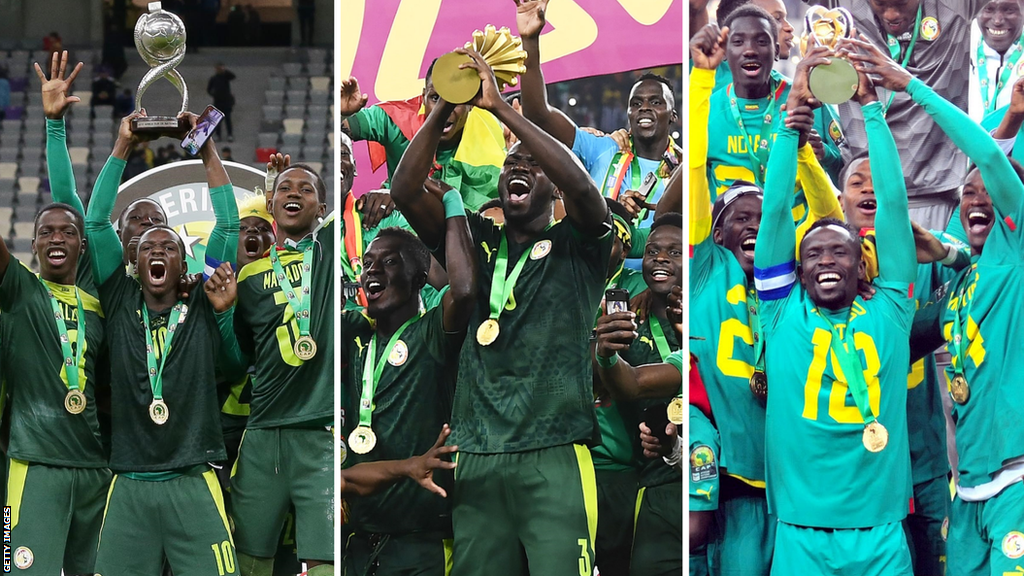
Senegal followed up their 2021 Africa Cup of Nations title (centre) with successes at the Under-17 Afcon and CHAN finals last year
Morocco may have made history in 2022 by becoming the first African team to reach the Fifa World Cup semi-finals, but the continent's dominant footballing force lies further down the coast in Senegal.
The Teranga Lions are defending their Africa Cup of Nations (Afcon) title in Ivory Coast this month, but that is just the tip of the iceberg.
Senegal are also reigning continental champions at Under-17 and Under-20 level, and even won the African Nations Championship (CHAN), the competition for domestic-based players for the first time last year.
Aliou Cisse's men began their Group C campaign with a 3-0 win over The Gambia on Monday as they look to become the first side to register back-to-back Afcon triumphs since Egypt won their third in a row in 2010.
"We have just the one star," the 47-year-old, referring to having lifted the trophy just once, said.
"We are keen to win again, to continue winning it."
Cisse himself was part of Senegal's original golden generation, which finished as runners-up at the 2002 Afcon before reaching the quarter-finals of the World Cup later that year on the country's debut at the finals.
Former international team-mate El Hadji Diouf believes Senegal's recent success is the result of both a strong partnership between the government and the country's football federation (FSF) and critical investment in facilities.
"Everywhere you go in Senegal, all the cities have academies," Diouf told BBC Sport Africa.
"They start young, at Under-10, and have tournaments every year. We want to improve that and have the same organisation like in England and France.
"I have to say congratulations and thanks for our government because that's a policy and they give the money. And the president of the FSF, Augustin Senghor, is working so well."
Senegal's hold over the African game even stretches to beach soccer, with the country winning the past four continental titles and finishing fourth at the last Beach Soccer World Cup in Russia in 2021.
Pathways and coaching stability
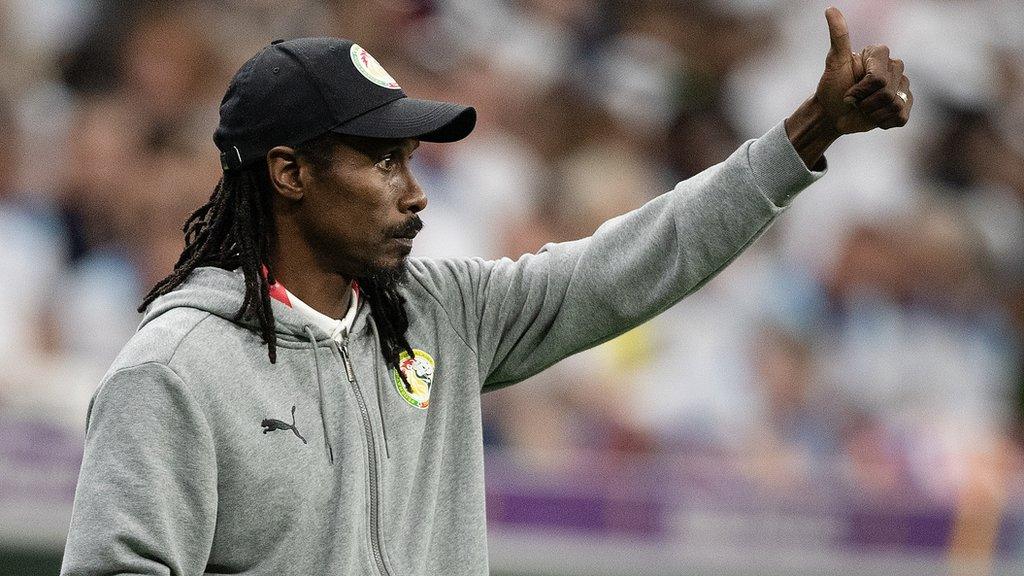
Aliou Cisse captained Senegal at the Africa Cup of Nations and World Cup in 2002, and has been national team coach since 2015
Alongside the establishment of local academies and infrastructure, Souleymane Diallo, a part-time coach of national age groups and a research professor at the Cheikh Anta Diop University in Dakar, says a pathway has been created to move talent from youth international level to the senior side.
"Senegal has an extraordinary potential of players and we're being patient with the generations," Diallo told BBC Sport Africa.
"At grassroots level, we have a very broad base and we're creating channels through which these players can reach the first team.
"The federation asks us to put players who have played in the lower categories on the radar, so that each generation can move on from a lower level to a higher one.
"If they finish their category at U17, they go to U20. If they finish at U20 they go on to the U23s, the CHAN team and the first team."
Another big factor in Senegal's long-term strategy has been to ensure stability in the dugout. Cisse has been in charge of the Teranga Lions since March 2015, and has slowly built towards success.
A quarter-final exit in the 2017 Afcon (on penalties) was followed by a defeat in the 2019 final, before Senegal returned to triumph in Cameroon in February 2022.
During that time the West Africans were the continent's top-ranked side for over four years before being replaced by Morocco following their historic World Cup run.
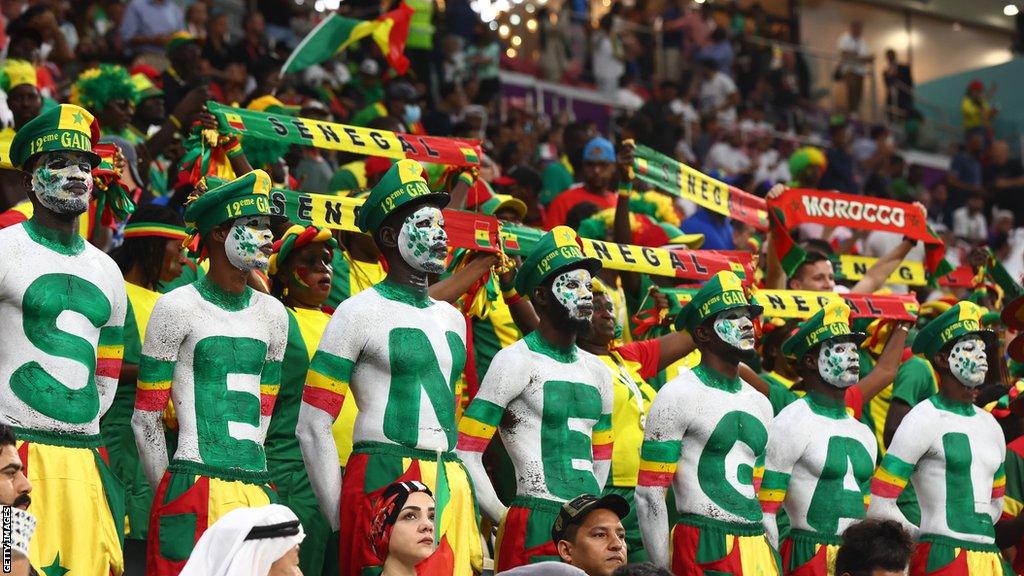
Senegal's colourful fans have got used to watching sides from the country lift continental trophies, but witnessed an earlier exit at the 2022 World Cup
Senegal exited in the last 16 in Qatar, beaten 3-0 by England, but there were no questions over Cisse's future.
"Senegal's policy is to insist that coaches stay on the national bench for as long as possible," Diallo said.
"A roadmap has been put in place which ensures all national coaches have the same requirements in terms of training content and information, and created channels for liaison."
Participating in continental and global tournaments at youth level more frequently has helped boost the nation's fortunes.
"The process of reaching the top level is a gradual one," Diallo said.
"In the past, we didn't win in Africa because we didn't regularly take part in African competitions.
"If you want to win, you have to be there first. The first step is to solve the problem of being present at these competitions, and that's what Senegal has done.
"We need to be present all the time, and it's now that we're going to lay the foundations for winning the World Cup in the future."
'Nothing to fear' in Ivory Coast
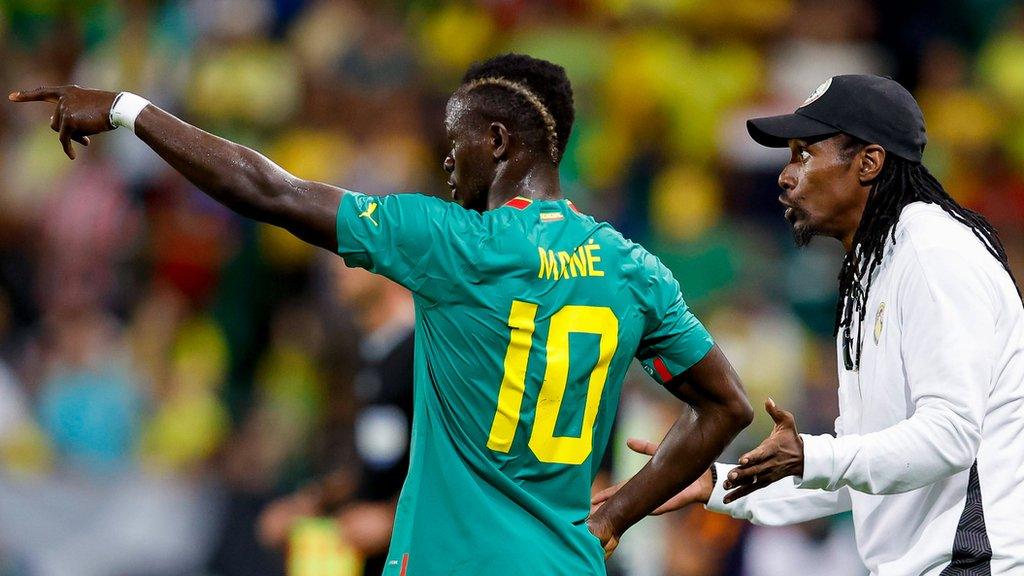
Senegal beat five-time world champions Brazil 4-2 in a friendly in June last year, with Sadio Mane scoring twice
As for their Afcon title defence, concerns have been raised about the fact that some of Senegal's key players now ply their trade in Saudi Arabia, with goalkeeper Edouard Mendy, captain Kalidou Koulibaly and talisman Sadio Mane all drawn there.
Previously Cisse had refused to select players from the Saudi Pro League because of its low quality in comparison to Europe's top flights.
"We showed we were capable of winning the title when we had players in the major European championships," Cisse said.
"Now we also must show we can win it with players who play in Saudi Arabia."
Diouf is bullish about Senegal's chances of retaining the trophy, and says former Liverpool and Bayern Munich forward Mane "wants to show everyone he is far from finished".
"We are the best team in Africa and we don't have to fear anything," the 42-year-old added.
"We have so much quality and I see the players are still hungry. The mix we have between the leaders of this team and the young boys is unbelievable.
"The only way we cannot win this Africa Cup of Nations is [by] not thinking we are the best."
And Mane, who netted the winning spot-kick in the final against Egypt in Cameroon just under two years ago, knows the effect taking the trophy back to Dakar once more could have.
"Winning the Afcon was the best trophy I have ever won in my life and coming to do it again will be special and a big achievement," he told Caf Online.
"Winning the Afcon will [have] a big impact for our football because we have won all the other categories, which is great for the country."
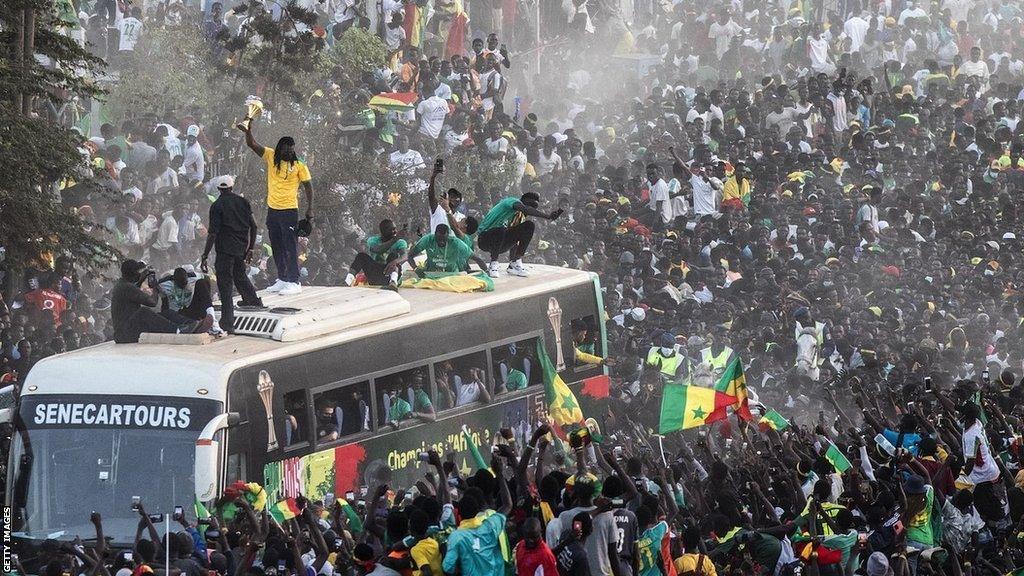
Crowds flocked to greet the Senegal squad on their return from the 2021 Africa Cup of Nations, with Cisse (yellow shirt) raising the trophy to show the masses
Additional reporting by Ian Williams.